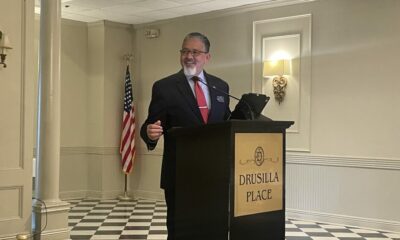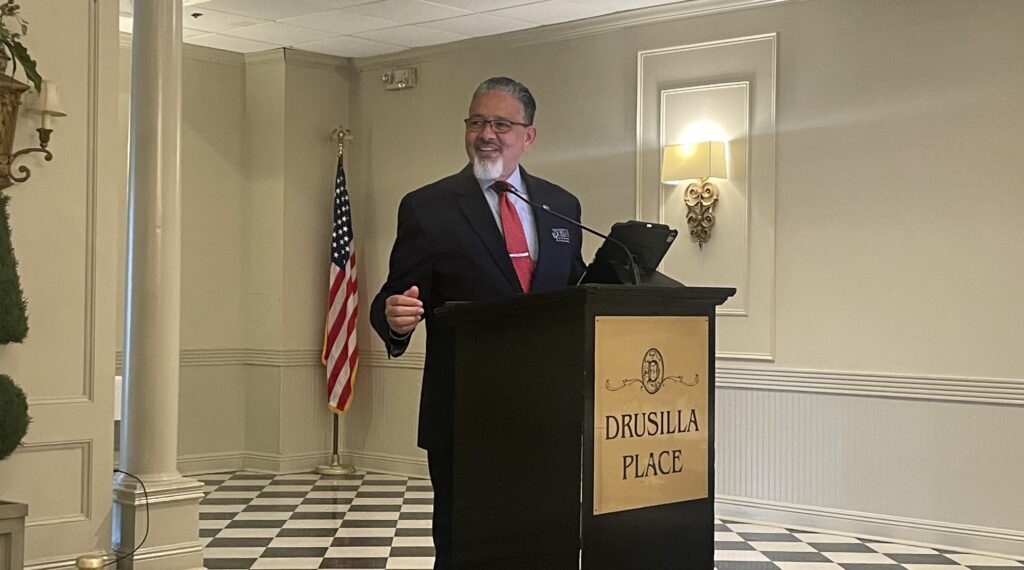lailluminator.com – Jennifer Shutt – 2025-02-06 19:37:00
U.S. Senate confirms Russ Vought, a Project 2025 author, to manage the nation’s budget
by Jennifer Shutt, Louisiana Illuminator
February 6, 2025
WASHINGTON — The U.S. Senate voted Thursday to confirm Russ Vought as director of the Office of Management and Budget, giving support to one of the architects of Project 2025 and someone who hopes to erode Congress’ control over government spending.
Vought, who worked as OMB director during President Donald Trump’s first term in office, was confirmed on a 53-47 party-line vote that followed Democrats keeping the chamber in session overnight to highlight their opposition.
Objections to Vought centered around his goal to give the president more authority over federal spending decisions, which Democrats said is a violation of the separation of powers in the Constitution.
“Congress makes laws and appropriates funds, not the president,” New Hampshire Sen. Maggie Hassan said. “At stake is not a legal technicality, at stake is our very notion of self-government, a notion that Mr. Vought appears to disdain.”
Hassan, a Democrat, referenced the Trump administration halting congressionally approved funding for grant and loan programs in late January as one example of OMB overreaching.
“The grant money was never the president’s to cut, freeze, or restore — it doesn’t belong to him or to Mr. Vought, it belongs to the American people,” Hassan said.
She also pointed to the Government Accountability Office finding OMB “violated” a federal law known as the Impoundment Control Act when it withheld $214 million in security assistance for Ukraine during the first Trump administration.
“It was five years ago this week that this body debated President Trump’s attempt to illegally impound funds that were intended for Ukraine,” Hassan said, referring to the first of two impeachments. “An impoundment attempt that was supported and directed by Mr. Vought.”
Obscure office with big clout
The Office of Management and Budget, also called the White House budget office, is responsible for submitting the president’s annual budget request to Congress, but it also has sweeping authority over federal regulations and federal agencies.
Acting OMB Director Matthew J. Vaeth caused considerable confusion in late January when he released a two-page memo calling for a halt to trillions in federal funding for grant and loan programs spread across departments and agencies.
The memo, which was later rescinded, led to two separate lawsuits and two federal judges issuing temporary restraining orders blocking the Trump administration from implementing the proposed funding freeze.
Senate Majority Leader John Thune, R-S.D., said Wednesday that Vought is qualified to become OMB director, in part, because he has already been OMB director.
“There’s no question that he will be able to hit the ground running,” Thune said. “As director of OMB, Mr. Vought will have the chance to address two key economic issues — cutting burdensome government regulations and addressing excessive spending.”
Thune said the United States is on a “dangerous spending track” and that the government should find “ways to reign in our spending and to target government waste.”
“And I’m confident that Mr. Vought will help lead that charge,” Thune said.
Rapid confirmation for Trump nominees
Vought’s confirmation marked the 13th of Trump’s nominees to receive Senate confirmation in the three weeks that he’s been in the Oval Office.
“That’s roughly twice as fast as nominees were confirmed at the start of the two previous administrations,” Thune said. “The Senate will take up additional nominees next week and will maintain an aggressive pace to get the president’s full team in place as soon as possible.”
Senate-confirmed nominees include, Secretary of State Marco Rubio, Central Intelligence Agency Director John Ratcliffe, Defense Secretary Peter Hegseth, Homeland Security Secretary Kristi Noem, Treasury Secretary Scott Bessent, Transportation Secretary Sean Duffy, Environmental Protection Agency Administrator Lee Zeldin, Interior Secretary Douglas Burgum, Energy Secretary Christopher Wright, Attorney General Pam Bondi and Housing and Urban Development Secretary Eric Turner.
‘Impoundment’ struggle
Vought has spent the past four years leading the Center for Renewing America, a think tank he launched following his tenure in the first Trump administration.
The organization has published repeatedly about the 1974 Impoundment Control Act and impoundment authority, arguing the president should be able to block funding Congress has approved.
The U.S. Constitution gives the legislative branch the so-called power of the purse, putting the authority over how federal dollars are spent in the hands of lawmakers.
Congress passed the Impoundment Control Act more than 50 years ago, after then-president Richard Nixon halted billions in funding the body had approved.
The law gives the president two ways to request that Congress rescind funding it already appropriated — sending a rescission request via a special message, which allows the president to hold onto the money for 45 days, or through a deferral sent through a special message.
“The President, OMB, or a department or agency head or employee may defer budget authority to provide for contingencies, effect savings, or as specifically provided by law,” according to a report from the nonpartisan Congressional Research Service. “No officer or employee of the United States may defer budget authority for any other purpose.”
During his confirmation hearing in the Senate Homeland Security and Governmental Affairs Committee, Vought testified he believes the president holds the ability to impound funding approved by Congress. Vought has also said repeatedly he believes the 1974 law is unconstitutional.
“The president has run on the issue of impoundment and has reminded the country that 200 years of presidents have used this authority,” Vought said during the hearing. “And we’ll be developing our approach to this issue and strategy once his administration is in office.”
Democrats have sounded alarm bells over the president potentially holding impoundment authority, saying it would make it extremely difficult for lawmakers to negotiate bipartisan agreement on the dozen annual government funding bills.
The president simply ignoring parts of a spending agreement would lead to even more distrust and gridlock within Congress, Democrats say.
Project 2025
Vought also wrote part of the Heritage Foundation’s Project 2025, a 922-page document outlining the conservative organization’s goals for a second Trump administration.
In a 26-page chapter on the executive office of the president, Vought wrote the OMB director “must ensure the appointment of a General Counsel who is respected yet creative and fearless in his or her ability to challenge legal precedents that serve to protect the status quo.”
Vought wrote that Trump “should use every possible tool to propose and impose fiscal discipline on the federal government.”
“Anything short of that would constitute abject failure,” Vought contended.
Vought also wrote about the management aspect of OMB’s portfolio, pressing for political appointees to have more authority and influence than career staff.
“It is vital that the Director and his political staff, not the careerists, drive these offices in pursuit of the President’s actual priorities and not let them set their own agenda based on the wishes of the sprawling ‘good government’ management community in and outside of government,” Vought wrote. “Many Directors do not properly prioritize the management portfolio, leaving it to the Deputy for Management, but such neglect creates purposeless bureaucracy that impedes a President’s agenda—an ‘M Train to Nowhere.’”
Last updated 6:37 p.m., Feb. 6, 2025
Louisiana Illuminator is part of States Newsroom, a nonprofit news network supported by grants and a coalition of donors as a 501c(3) public charity. Louisiana Illuminator maintains editorial independence. Contact Editor Greg LaRose for questions: info@lailluminator.com.



















































